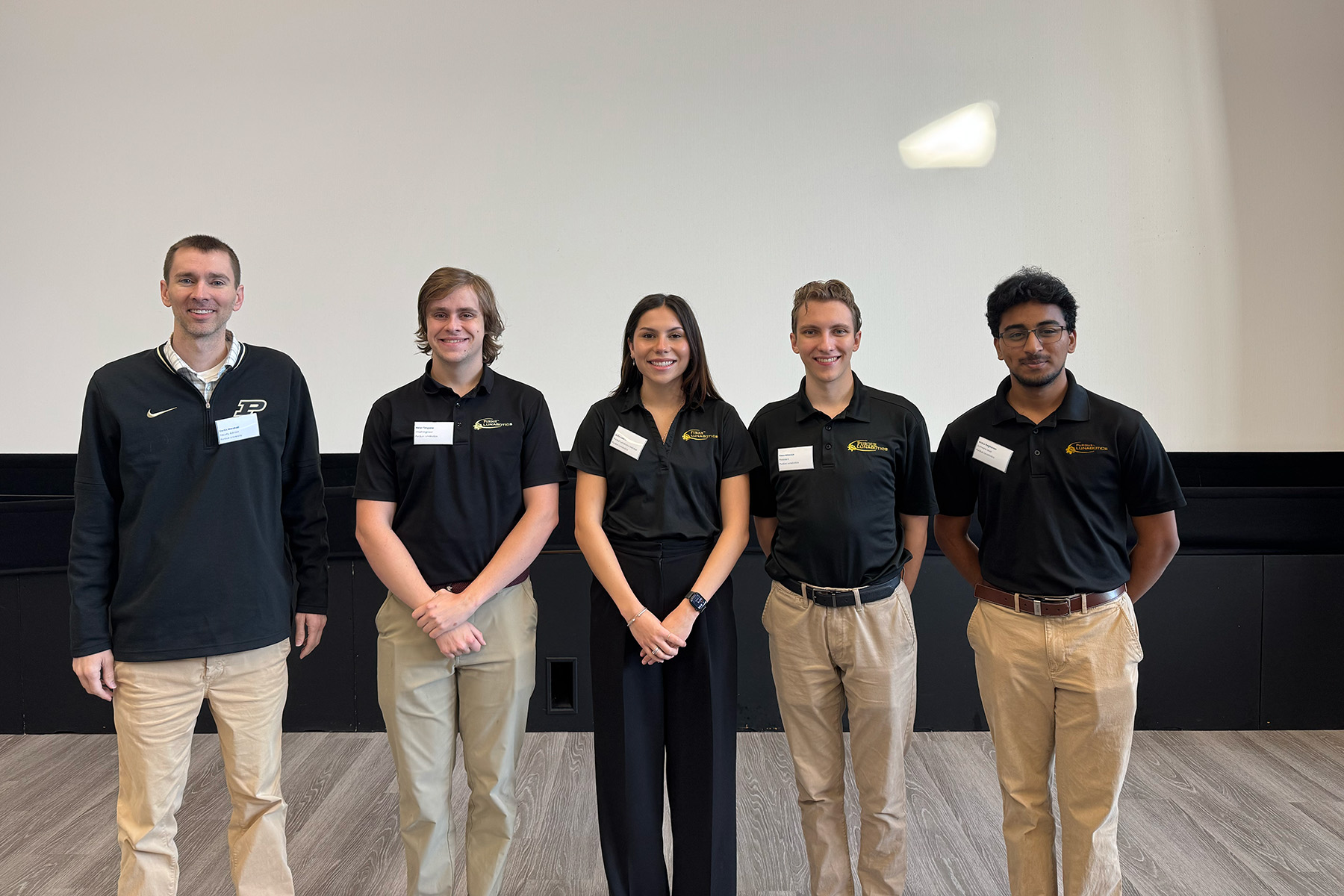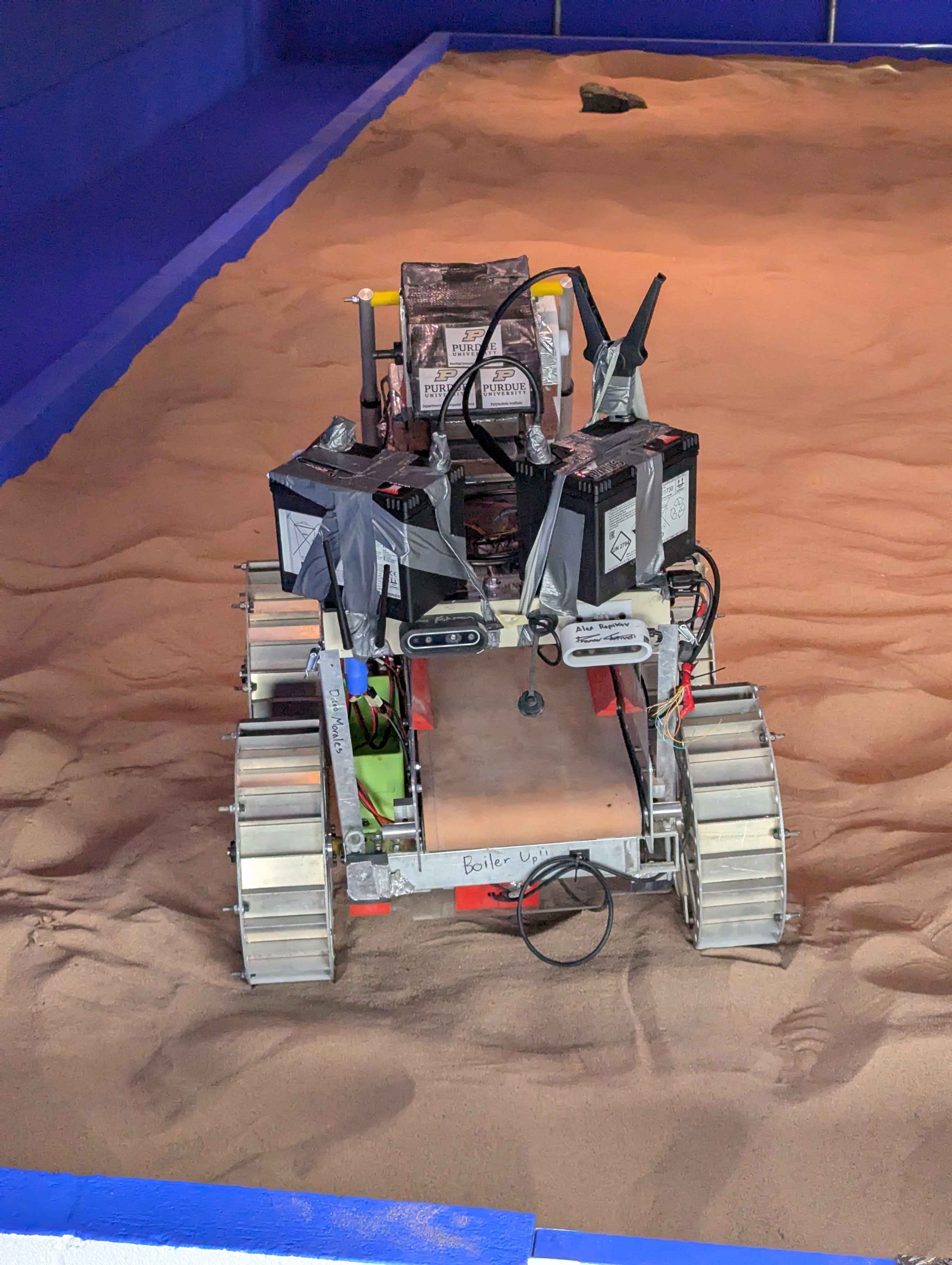Purdue Lunabotics travels abroad for first U.K. Lunabotics competition

“This experience affirmed Purdue’s position as a leading force in the global Lunabotics community,” said Hans Milaniak, junior in mechanical engineering and president of Purdue Lunabotics. “I only hope that this event is the first of many future successes.”
Purdue Lunabotics began in 2012 as a small VIP class where students built a robot capable of mining and transporting lunar regolith — loose rock and dust found on terrestrial planets or moons — to compete in the Robotic Mining Program. By 2014, growing passion for the mission led to a fully established student organization. Today, members can be found sketching concepts, machining in the Bechtel Innovation Design Center (BIDC), troubleshooting code, or testing robots at the beach volleyball courts or in their custom-built testing pit. Along the way, their dedication has earned them national recognition — most recently a first-place finish in Autonomy at NASA’s 2025 Lunabotics Challenge held at the Kennedy Space Center.
This September, four Purdue students were chosen to fly overseas for three days to attend the launch of the Lunabotics competition in the U.K. at The Open University in Milton Keynes. With only a month to prepare, students had to quickly make travel plans, get ahead of classes, and figure out how to safely ship bags full of wires and robot parts.

The club had decided to bring their robot Reggie — short for Regolith — abroad, becoming the first robot in the club’s history to travel overseas. However, the trip to the U.K. was not without its challenges. The robot uses a 350-watt-hour lithium polymer battery, but TSA restricts the batteries you can travel with to under 100-watt-hours. So, students decided to ship a new battery to the hotel they’d be staying in. They made sure the battery would arrive a few days before they did to ensure they would have it in time for the event. Unfortunately, the delivery date kept getting pushed back and they realized they needed a plan B.
Thankfully, standard car batteries abroad are 12 volts, and wiring two together produced enough power to fuel the robot. They were able to obtain the batteries from a local automotive shop and headed back to the hotel for a late night of work. After a few hours and lots of duct tape, the four students gathered around the robot, flipped the switch and watched the robot come to life.

“Although we had to overcome various challenges, like having to replace our undelivered battery with two car batteries, it was such a joy to just attend the competition and talk with the other teams,” said Peter Timpane, senior in mechanical engineering and the club’s former chief engineer.
Another challenge they faced was balancing this opportunity with the role of being a full-time student. During every second of downtime, the students were working on homework due in another time zone. Whether it was studying on the plane ride over, in the hotel room at night or in between events during the day, the team demonstrated true grit.
Then came launch day. The team led technical workshops on systems engineering, robot design, fabrication, assembly, and testing, and demonstrated Reggie to students, faculty, and industry representatives. They also discussed team structure and answered questions from newly formed U.K. teams.
Each student presented on a mechanical subteam, describing the drivetrain, excavation, deposition, electrical, and control systems on Reggie. Notably, Purdue Lunabotics was the only team to demonstrate their robot in motion. By sharing practical insights—such as using shrouds to mitigate dust entering the rover’s electrical components during excavation—the team helped inspire the formation of at least five new UK teams, marking the start of a growing international Lunabotics community.

For many on the team, the moment was not only professional, but also deeply personal. “Standing there, representing Purdue Lunabotics on an international stage, I felt immense pride, gratitude, and a renewed belief in what passion and perseverance can achieve,” said Sofia Velarde, senior in mechanical engineering and former president of the club. “This trip was a full circle moment for me. Starting as a freshman, then becoming treasurer, president, and finally ending my journey by traveling to the UK with Peter, Hans, and Ankur, made me reflect on how far I’ve come and how much love and dedication I’ve poured into this organization.”
Purdue Lunabotics’ participation in the U.K. Lunabotics Competition launch marked a pivotal milestone of the team’s rapid growth and rising global presence. In just a few years the organization transformed from a 36-member club with limited resources to a fully established organization with industry partnerships, a test pit facility, an active VIP program and more than 100 members at every meeting.
The U.K. trip showcased a significant step forward, demonstrating the team’s ability to mobilize quickly, adapt under pressure, and perform effectively on an international stage. Purdue students formed meaningful relationships with Iowa State and U.K. students and left lasting impressions on Caterpillar, NASA, and The Open University reinforcing the strength of Purdue’s leadership within the global Lunabotics community.
